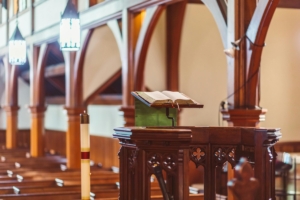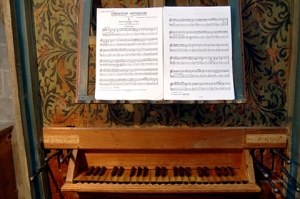During the summer before my freshman year of high school, I volunteered at my church’s Vacation Bible School program to lead games for the preschoolers. Something I noticed was that the students were more likely to listen to directions to do something than directions not to do something. I remember telling a girl to please refrain from putting her hands into the water bucket. And what do you think she did? She put her hands in the water bucket. Continue reading →
Rule of Worship
The Reformation, The Regulative Principle, And The Modern Church: Examining Calvin’s Dedication To Purity In Worship (Part 1)
Walk into any corporate worship service today and you will almost certainly observe that the congregational singing is accompanied by instruments. There is no doubt that the common worship style of today, filled with various instruments and too often supplemented by stage lights and smoke machines, differs significantly from the worship one would have observed in a seventeenth-century Reformed church. Continue reading →
Does “Sing To Him A New Song” Justify Praise Songs?
We must read the injunctions to “sing a new song” in light of what the New Testament teaches us about types, (fore)shadows, and copies. Continue reading →
How To Give Up Instruments
As difficult as it was to reform the Dutch churches, rarely have Reformed people been in our situation: free churches (i.e., not state churches) that must persuade a free people to reform worship by giving up the only way of worship most have ever known. Continue reading →
If Instruments, Why Not Swords? (Part 3)
The question before us is how to regard the swords and the herem (חרמ) holy war implied in Psalm 149:6–9 alongside the tambourines, lyres, and dancing of Psalm 149:3. Continue reading →
If Instruments, Why Not Swords? (Part 2)
The question before us is how to regard the swords and the herem (חרמ) holy war implied in Psalm 149:6–9 alongside the tambourines, lyres, and dancing of Psalm 149:3. Continue reading →
If Instruments, Why Not Swords? (Part 1)
Let them praise his name with dancing, making melody to him with tambourine and lyre! For Yahweh takes pleasure in his people; he adorns the humble with salvation. Let the godly exult in glory; let them sing for joy on their beds. . . . Continue reading →
Noah And The Regulative Principle Of Worship
Imagine that you get free reign to design the plans for your dream home. You get to pick the kind of rooms you have, you get to decide the layout for where those rooms go, and you get to determine all the . . . Continue reading →
Psalters!
When I began to become Reformed (c. 1980–81), the Reformed churches I knew were hymn-singing congregations. Typically, they used the blue Trinity Hymnal (1961), published by the Orthodox Presbyterian Church (and later by Great Commission Publications). There are Psalms (for singing and . . . Continue reading →
Video: Bob Godfrey On How God Wants Us To Worship Him
Chris Gordon and Dr. Robert Godfrey discuss Reformed worship. Continue reading →
Is All Of Life Worship?
Is all of life worship? That was the question set for Dr Clark at the Great Lakes Reformed Conference October 14, 2023. Audio RESOURCES Resources On The Rule Of Worship Subscribe To The Heidelblog! The Heidelblog Resource Page Heidelmedia Resources The Ecumenical . . . Continue reading →
Heidelminicast: Preview — Great Lakes Reformed Conference
It’s a preview of the Great Lakes Reformed Conference coming up on October 14, 2023 with Harrison Perkins. Continue reading →
Is the Offering an Element, a Circumstance, or Neither?
The Reformed churches order their worship services according to the Regulative Principle of Worship (RPW) This principle says that we must do only that which God has commanded in his Word. When planning the elements (see below) of a service, the only . . . Continue reading →
Saturday Psalm Series: Psalms, Hymns, Spiritual Songs, and Instruments in the Vulgate (Part 2)
The Latin Bible was a major formative influence on the way the Reformed theologians interpreted Scripture. The King James Version/Authorized Version (1611) particularly reflects the influence of the Latin Bible, but its influence reverberates in many English translations. It influenced their word . . . Continue reading →
George Gillespie and the Regulative Principle of Worship (Part 2)
A Dispute Against the English Popish Ceremonies (1637)
In each of his four main arguments, Gillespie stayed true to the Rule of Worship. He steadfastly contended against the Anglican bishops by asserting the authority of God’s Word in binding the conscience of the Christian in the worship of God. This was the same defense employed by the Reformers before him and it is the same doctrine which Reformed Christians find in their confessions and catechisms in the present day. Continue reading →
George Gillespie and the Regulative Principle of Worship (Part 1)
During the Protestant Reformation of the 16th and 17th centuries, one of the doctrines in which the Reformers saw a particular need for reforming was the doctrine of worship. In his 1543 treatise The Necessity of Reforming the Church, John Calvin (1509–64) wrote, . . . Continue reading →
PCA Worship Is Better But It Has Some Distance Yet To Go
The state of worship in the Presbyterian Church in America is arguably better than it has ever been, at least as far as liturgy goes. More churches now use recognizably Reformed liturgies than at any point in the denomination’s history. These are . . . Continue reading →
Heidelminicast: David’s Journey Away From Reformed Worship And Back
These are some of our favorite Heidelquotes. Something to think about from the Heidelcast. If you are subscribed to the Heidelcast or the Heidelblog (see below) you will receive these episodes automatically. All the Episodes of the Heidelcast How To Subscribe To Heidelmedia . . . Continue reading →
Heidelminicast: The Reformed Churches In Nassau Rejected Instruments In Public Worship
These are some of our favorite Heidelquotes. Something to think about from the Heidelcast. If you are subscribed to the Heidelcast or the Heidelblog (see below) you will receive these episodes automatically. All the Episodes of the Heidelcast How To Subscribe To Heidelmedia . . . Continue reading →
The Sturdy Legs Of Worship
Why will unscriptural, man-centered, culturally conditioned, over-contextualized worship undermine confessional orthodoxy? Because worship by its very form (which ought to be according to spirit—uppercase and lowercase— and truth) communicates certain things about the nature of God and man, thus theology proper and . . . Continue reading →












